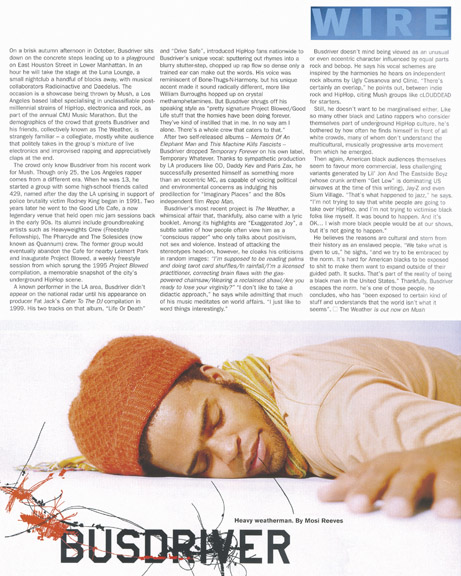
BUSDRIVER
On a brisk afternoon in October, Busdriver sits down on the concrete steps leading up to a playground on east Houston Street in Lower Manhattan. In an hour he will take the stage at the Luna Lounge, a small nightclub a handful of blocks away, with musical collaborators Radioinactive and Daedelus. The occasion is a showcase being thrown by Mush, a Los Angeles based label specialising in unclassifiable post-millennial strains of HipHop, electronica and rock, as part of the annual CMJ Music Marathon. But the demographics of the crowd that greets Busdriver and his friends, collectively known as The Weather, is strangely familiar - a collegiate, mostly white audience that politely takes in the group's mixture of live electronics and improvised rapping and appreciatively claps at the end.
The crowd only know Busdriver from his recent work for Mush. Though only 25, the Los Angeles rapper comes from a different era. When he was 13, he started a group with some high school friends called 429, named after the day the La uprising in support of police brutality victim Rodney King began in 1991. Two years later he went to the Good Life Café, a now legendary venue that held open mic jam sessions back in the early 90's. Its alumni include groundbreaking artists such as Heavyweights Crew (Freestyle Fellowship), The Pharcyde and The Solesides (now known as Quannun) crew. The former group would eventually abandon the Café for nearby Leimert Park and inaugurate Project Blowed, a weekly freestyle session from which sprung the 1995 Project Blowed compilation, a memorable snapshot of the city's underground HipHop scene.
A known performer in the La area, Busdriver didn't appear on the national radar until his appearance on producer Fat Jack's Cater To The DJ compilation in 1999. His two tracks on that album, "Life Or Death" and "Drive Safe", introduced HipHop fans nationwide to Busdriver's unique vocal: sputtering out rhymes into a blurry stutter-step, chopped up rap flow so dense only a trained ear can make out the words. His voice was reminiscent of Bone-Thugs-N-Harmony, but his unique accent made it sound radically different, more like William Burroughs hopped up on crystal methamphetamines. But Busdriver shrugs off his speaking style as "pretty signature Project Blowed/Good Life stuff that the homies have been doing forever. They've kind of instilled that in me. In no way am I alone. There's a whole crew that caters to that."
After two self-released albums - Memoirs Of An Elephant Man and This Machine Kills Fascists - Busdriver dropped Temporary Whatever. Thanks to sympathetic production by LA producers like OD, Daddy Kev and Paris Dax, he successfully presented himself as something more than an eccentric MC, as capable of voicing political and environmental concerns as indulging his predilection for "Imaginary Places" and the 80s independent film Repo Man.
Busdriver's most recent project is The Weather, a whimsical affair that, thankfully, also came with a lyric booklet. Among its highlights are "Exaggerated Joy", a subtle satire of how people often view him as a "conscious rapper" who only talks about positivism, not sex and violence. Instead of attacking the stereotypes head-on, however, he cloaks his criticisms in random images: "I'm supposed to be reading palms and doing tarot card shuffles/ In rainfall/ I'm a licensed practitioner, correcting brain flaws with the gaspowered chainsaw/ Wearing a reclaimed shawl/ Are you ready to lose your virginity?" "I don't like to take a didactic approach," he says while admitting that much of his music meditates on world affairs. "I just like to word things interestingly."
Busdriver doesn't mind being viewed as an unusual or even eccentric character influenced by equal parts rock and bebop. He says his vocal schemes are inspired by the harmonies he hears on independent rock albums by ugly Casanova and Clinic. "There's certainly an overlap," he points out, between indie rock and HipHop, citing Mush groups like cLOUDDEAD for starters.
Still, he doesn't want to be marginalised either. Like so many other black and Latino rappers who consider themselves part of underground HipHop culture, he's bothered by how often he finds himself in front of all white crowds, many of whom don't understand the multicultural, musically progressive arts movement from which he emerged.
Then again, American black audiences themselves seem to favour more commercial, less challenging variants generated by Lil' Jon And The Eastside Boyz (whose crunk anthem "Get Low" is dominating US airwaves at the time of this writing), Jay-Z and even Slum Village. "That's what happened to jazz," he says. "I'm not trying to say that white people are going to take over HipHop, and I'm not trying to victimise black folks like myself. It was bound to happen. And it's OK - I wish more black people would be at our shows, but it's not going to happen."
He believes the reasons are cultural and stem from their history as an enslaved people. "We take what is given to us." He sighs, "and we try to be embraced by the norm. It's hard for American blacks to be exposed to shit to make them want to expand outside of their guided path. It sucks. That's part of the reality of being a black man in the United States." Thankfully, Busdriver escapes the norm. He's one of those people, he concludes, who has "been exposed to certain kind of stuff and understands that the world isn't what it seems".
MOSI REEVES